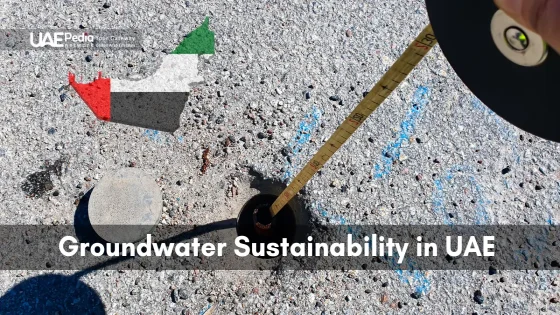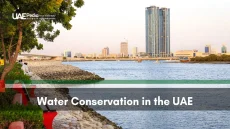What if the hazy horizon you see in the Emirates isn’t just desert dust—but a cocktail of challenges demanding urgent attention? Beneath the glittering skylines lies a story of balancing rapid growth with environmental stewardship.
The region’s air quality struggles stem from two main sources: energy production tied to its economic backbone and natural desert conditions. Human Rights Watch reports reveal pollutant levels exceeding WHO limits in urban hubs—a reality echoed by migrant workers facing respiratory issues after long shifts outdoors.
Government initiatives like real-time monitoring networks and emission-reduction targets show progress. Yet COP28 discussions highlight how climate pressures complicate these efforts. One construction worker shared: “We know the air burns our throats sometimes, but work can’t stop.”
This isn’t about blame, but understanding layered solutions. From tech-driven sensors to cultural shifts toward sustainability, the Emirates charts a unique path through environmental challenges we’ll unpack ahead.
Key Takeaways:
- Fossil fuel reliance and natural dust create complex air quality challenges
- Health impacts disproportionately affect outdoor workers
- Smart monitoring systems expand alongside climate goals
- Regional growth and global environmental needs intersect here
Understanding the Current Air Quality Landscape in the UAE
Recent satellite snapshots reveal a swirling dance between golden sands and smokestack shadows across the Emirates. Ground sensors track particulate matter like meticulous storytellers—PM2.5 averages here often triple national air quality index manual safety thresholds. “You can taste the difference between desert winds and factory emissions by noon,” shares a Dubai-based environmental engineer.
When Nature Meets Progress
Desert storms contribute 60% of coarse particles annually—a natural rhythm older than cities. But human activity adds finer, more dangerous specks. World Bank data shows industrial zones emit nitrogen oxides at rates comparable to megacities like Mumbai. These invisible guests linger longer than sand, slipping past masks and AC filters.
The Global-Local Tug-of-War
While Paris debates carbon taxes, Gulf breezes carry unique challenges. Local PM2.5 readings hit 48 µg/m³ last year—over four times WHO’s recommended limit. Compare that to Los Angeles’ 12 µg/m³ average. Yet context matters: regional dust accounts for 35% of particulates versus 15% from vehicles and power plants. It’s not either/or—it’s layered realities needing smart solutions.
Monitoring Systems and Advanced Data Collection
Imagine a digital spiderweb stretching across cities and deserts—threads of real-time data humming with updates every 90 seconds. This isn’t sci-fi. It’s how modern monitoring works here, blending ground stations with eyes in the sky.
Ground-Based Sensors and Satellite Remote Sensing
Over 40 high-tech stations dot urban areas, sniffing out PM2.5 and nitrogen dioxide like bloodhounds. But deserts play tricks—sandstorms can bury sensors. That’s where Europe’s Copernicus satellites swoop in, mapping pollutant trails even over dunes. One engineer joked: “Our sensors have PhDs in dust management.”
Yet gaps remain. Rural zones sometimes go dark for hours. “Satellites see the big picture, but miss street-level stories,” notes a National Air Quality Platform report. That’s why morning dust levels often surprise commuters—nature’s curveball.
Insights from Embassy and National Air Quality Platforms
Ever check your phone for health alerts? Diplomatic posts share AirNow updates—the same system protecting DC joggers. Locals and expats alike track ozone spikes through government apps. “It’s like weather forecasting, but for breathability,” says a Sharjah schoolteacher.
These systems don’t just count particles. They reveal patterns—how Friday traffic dips clean the air, or which industrial zones need stricter rules. When sensors whisper, policymakers listen. Because clean skies start with smart information.
UAE air pollution: Challenges, Health Impacts, and Trends
Beneath the shimmering skylines, a silent challenge lingers—how breathable is progress? Let’s unpack what’s swirling in that desert breeze beyond the postcard views.
Invisible Threats, Visible Consequences
WHO’s safety threshold for PM2.5 sits at 5 µg/m³ annually. Last year’s readings here averaged 48 µg/m³—nearly ten times higher. These micro-particles dive deep into lungs, linked to asthma spikes and heart conditions. “It’s like smoking half a pack daily,” says a nurse at a Dubai clinic.
| Pollutant | WHO Guideline | Local Average |
|---|---|---|
| PM2.5 | 5 µg/m³ | 48 µg/m³ |
| NO₂ | 10 µg/m³ | 67 µg/m³ |
| SO₂ | 20 µg/m³ | 41 µg/m³ |
Those Who Feel It First
HRW reports reveal outdoor workers face PM2.5 levels 35% higher than indoor peers. Construction teams in Abu Dhabi describe “coughing up gray phlegm after shifts”. Children and elders aren’t spared—ER visits for bronchitis jump 22% during dust storms.
Climate change cranks up the heat—literally. Rising temperatures accelerate ozone formation while drying soils boost dust emissions. It’s a feedback loop: fossil fuel use worsens conditions that demand more energy for cooling. The solution? Smarter air quality monitoring paired with emission cuts—because every breath counts.
Government Policies and Climate Action Commitments
Walking through Abu Dhabi’s Masdar City feels like time-traveling—solar panels stretch where oil rigs once dominated. Yet just 80 miles north, new fossil fuel projects break ground. This duality defines the Emirates’ climate strategy: balancing ambitious green targets with economic realities.
Promises on Paper, Progress on the Ground
The nation’s updated 2023 NDCs pledge 40% emission cuts by 2030—a bold leap from earlier plans. But leaked documents reveal approved oil production increases could negate 72% of those gains. “We’re building wind farms while expanding gas exports,” explains a policy advisor. “It’s not hypocrisy—it’s transition management.”
| Initiative | Target | Fossil Fuel Impact |
|---|---|---|
| Renewable Energy | 14 GW by 2030 | Displaces 21% oil use |
| Carbon Capture | 5M tons/year by 2025 | Supports continued extraction |
| Methane Reduction | 30% cut by 2030 | Applies only to new projects |
Abu Dhabi’s recent Hail and Ghasha offshore fields approval—set to produce 1.5 billion cubic feet of gas daily—spotlights the tension. While partnered with global climate groups, the Emirates still leans on hydrocarbons to fund its green shift. Critics argue this “both lanes” approach risks missing critical deadlines.
Global Spotlight, Local Realities
United Nations climate reports increasingly pressure Gulf states, yet regional leaders emphasize their unique position. “North Africa’s energy needs are exploding,” notes an energy minister. “Should we deny them affordable power while Europe still burns coal?” The answer lies in smarter quality monitoring systems that track progress beyond carbon math.
New policies like the 2024 Air Quality and Health Initiative show promise—outdoor air sensors now guard 89% of urban schools. But with three major oil expansions underway near residential areas, residents wonder: Can you out-tech a drilling rig? The Emirates bets yes—but the world watches breathlessly.
International Collaboration and Regulatory Frameworks
Think global standards only matter in boardrooms? Try telling that to a parent checking air quality apps before sending kids to school. Worldwide networks now shape what we breathe—here’s how invisible handshakes between nations create real change.
Rulebooks Written Together
The World Health Organization’s 2021 air quality guidelines became the playbook for 127 countries. Their strict PM2.5 limits pushed monitoring systems into overdrive. “We used regional data from the Eastern Mediterranean,” explains a WHO air quality specialist. “But local realities required custom solutions.”
United Nations programs bridge gaps between desert climates and urban hubs. The Climate and Clean Air Coalition’s 2030 targets align with regional goals—cutting methane emissions 45% while expanding solar power. It’s not one-size-fits-all, but tailored teamwork.
| Initiative | Global Standard | Local Adoption |
|---|---|---|
| WHO Air Quality | PM2.5 ≤5 µg/m³ | Phased 2030 target |
| UN SDG 11 | Monitor 100% cities | 87% coverage achieved |
| Paris Agreement | 1.5°C pathway | 40% emission cuts pledged |
Your Breath, Their Blueprint
Diplomatic cables now carry sensor data alongside trade deals. When European satellites detected unusual ozone levels over the Gulf, it sparked joint research with local universities. The findings? Modified refinery schedules during peak heat.
Change happens when borderless science meets street-level needs. As one UN envoy puts it: “Clean air isn’t a national trophy—it’s the world’s shared oxygen.” From power plant regulations to schoolyard sensors, we’re all breathing the same future into being.
Innovative Technologies Empowering Air Quality Monitoring
Picture a drone humming over refinery stacks—not snapping Instagram shots, but sniffing out invisible threats. This is today’s environmental tech playground, where hyperlocal sensors and AI crunch numbers faster than a TikTok algorithm.
Data Whisperers
New portable devices now detect 27 chemical compounds simultaneously—from methane leaks to gasoline vapors. “We’ve gone from lab results in weeks to street-level reports in minutes,” says a Dubai-based tech developer. These tools merge satellite feeds with ground readings, creating pollution maps as detailed as subway diagrams.
| Technology | Data Sources | Use Case |
|---|---|---|
| Hyperlocal Sensors | Traffic cameras, weather stations | Track street-level ozone spikes |
| AI Satellites | Thermal imaging, emission plumes | Monitor oil production sites |
| Blockchain Networks | Factory sensors, shipping logs | Verify fuels compliance |
Future-Proofing Breathability
Real-time dashboards now predict trouble hours before it arrives—like a weather app for your lungs. During last month’s gas flare incident, alerts reached 500,000 phones in 9 minutes. Systems even suggest alternate jogging routes when PM2.5 climbs.
The magic? Blending old-school monitoring with crowdsourced data. Construction crews now wear smart helmets that double as air samplers. It’s not just about more numbers—it’s smarter connections between sources, people, and solutions. Tomorrow’s air quality report might just save your morning run.
Social and Economic Implications of Air Pollution in the Region
Picture children playing tag under skies tinged with more than just sunset hues—this scene captures the double-edged sword of progress. While growth fuels opportunity, its invisible byproducts reshape lives in ways we’re just beginning to measure.
When Breath Becomes a Luxury
A recent study found respiratory meds account for 18% of household spending in industrial zones. “We ration inhalers like groceries,” shares a Ras Al Khaimah mother. Sandstorms—once seasonal—now arrive monthly, pushing ER visits up 40% during peak months. Schools test air purifiers while parents debate outdoor recess limits.
Counting the Cost of Hazy Skies
The economic impacts ripple beyond hospitals:
- Construction delays from low visibility cost $220M annually
- Tourism revenue dips 7% during prolonged dust events
- Workers lose 23 productive hours/year due to pollution-related sick days
Yet hope fuels action. The 2030 environmental roadmap funds green belts to trap particulates—a project already reducing storm dust by 14% in pilot areas. Community solar cooperatives cut carbon footprints while creating local jobs. As one engineer notes: “Cleaner air isn’t just healthier—it’s cheaper long-term.”
From neighborhood mask drives to AI-powered early warning systems, solutions blend tradition with innovation. The path forward? Treat every breath as shared currency—precious, finite, and worth protecting together.
Pathways Toward a Cleaner and Healthier Future
Imagine standing where golden dunes meet gleaming solar farms—a crossroads between yesterday’s energy and tomorrow’s innovation. This pivotal moment demands swift action: Human Rights Watch urges phasing out fossil fuels while national climate plans chart renewable investments worth billions. The clock ticks, but progress shines through smarter industry practices and community-driven change.
Three urgent steps emerge from our journey:
First, upgrade emission standards for heavy industry—the top polluter. Real-time monitoring systems now make enforcement feasible. Second, accelerate solar and wind projects to meet 2030 clean energy targets. Third, empower workers with health protections during high-risk times like midday heatwaves.
Success stories already spark hope. Schools using air quality alerts report fewer asthma cases. Factories adopting AI-driven sensors cut emissions by 18% in six months. Yet this race against time needs everyone’s stride—from policymakers tightening rules to families choosing electric rideshares.
The path ahead? Clearer skies through unity. As one engineer told me: “We’re not just building infrastructure—we’re crafting breathable futures.” With grit and green tech, that horizon glows closer than it appears.
The National Air Quality Platform provides live updates via ground sensors and satellite feeds. Apps like AirVisual or Plume Labs also integrate local data from Dubai and Abu Dhabi stations, showing PM2.5, ozone, and dust storm alerts.
Studies show higher rates of respiratory issues in urban areas due to particulate matter. The WHO notes seasonal dust storms temporarily spike PM10 levels 8x above guidelines, impacting outdoor workers and those with asthma.
Yes—the UAE’s updated NDC targets 40% emissions cuts by 2030. Solar parks like Al Maktoum and Barakah’s nuclear plant aim to balance oil production with cleaner energy, though challenges remain in heavy industries.
The UN Environment Programme collaborates on regional haze monitoring, while WHO benchmarks guide National Agenda 2021 targets. Emirates like Sharjah now use these standards for industrial zoning and green transport incentives.
Absolutely! AI models analyze weather patterns to forecast sandstorms 72 hours ahead. Drones in Ras Al Khaimah map construction sites, and smart sensors on highways track rush-hour NO2 levels for real-time traffic adjustments.
A> The Ministry of Climate Change shares advisories during peak pollution days. Many malls and hotels use advanced filtration—look for BlueAir-certified spaces. N95 masks are recommended for desert safaris on windy days.
A> The Ministry of Climate Change shares advisories during peak pollution days. Many malls and hotels use advanced filtration—look for BlueAir-certified spaces. N95 masks are recommended for desert safaris on windy days.


















